Blog (446 found)
More Armed Conflict, More Landmines
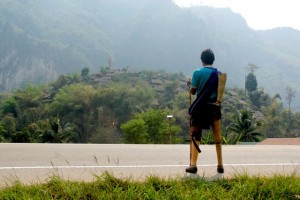 Last Thursday, 4 April, was International Day of Mine Awareness. While over 80% of the world’s countries have signed or agreed to the 1997 Ottawa Convention banning the use of landmines, Burma is among the 20% who have not. Recent statistics place Burma as the country with the third largest amount of land mine causalities in the world. From 1999 to 2011, over 3,000 men, women and children have lost their lives to mines in Burma. A week and a half ago, two porters, forcibly conscripted by the Burma Army, were killed in Northern Shan State by landmines.
Last Thursday, 4 April, was International Day of Mine Awareness. While over 80% of the world’s countries have signed or agreed to the 1997 Ottawa Convention banning the use of landmines, Burma is among the 20% who have not. Recent statistics place Burma as the country with the third largest amount of land mine causalities in the world. From 1999 to 2011, over 3,000 men, women and children have lost their lives to mines in Burma. A week and a half ago, two porters, forcibly conscripted by the Burma Army, were killed in Northern Shan State by landmines.
Mines are regularly used by both government forces and non-state armed groups. Parts of Northern and Eastern Burma have some of the highest concentration of mines in the world. The Land Mine and Cluster Munitions Monitor identifies over 47 townships in Kachin, Karen, Karenni, Mon, Arakan and Shan States that suffer from mine contamination as well as in Pegu and Tenasserim Regions […]
Daw Aung San Suu Kyi’s Political Reconciliation with Burma’s Armed Forces
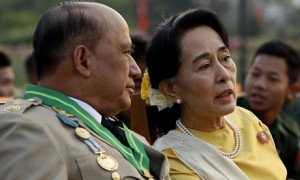 On 27 March, Burma’s Armed Forces Day was commemorated with its usual military fanfare. But this year, Daw Aung San Suu Kyi sat in the front row of the parade, raising concerns about her closeness to the army.
On 27 March, Burma’s Armed Forces Day was commemorated with its usual military fanfare. But this year, Daw Aung San Suu Kyi sat in the front row of the parade, raising concerns about her closeness to the army.
Daw Aung San Suu Kyi was similarly criticized for her comment on BBC’s Desert Island Disks radio show about her “fondness” for her father’s army. While Daw Suu appears to be cozying up the Burma Army as an attempt of political reconciliation in her push towards the 2015 elections, the public widely continues to see the country’s security forces as the perpetrators of human rights violations especially in ethnic nationality areas and of brutal crackdowns on civilians in 1988, 2007 and most recently in November 2012 against protesters and monks at the Letpadaung copper mine.
The Burma Army continued this week to launch offensives against the Kachin Independence Army (KIA) in northeastern Shan State, two weeks after the latest peace talks in Ruili, China. There have also been reports of shelling and looting of villages in Kachin State despite President Thein Sein insisting on his visit to Austria at the beginning of the month, “There’s no more hostilities, no more fighting all over the country, we have been able to end this kind of armed conflict.” General Gun Maw, deputy chief of the KIA said after the 11 March talks, “They wanted us to sign a ceasefire agreement first, but there are many issues to discuss about the peace process before we can reach a ceasefire.”
Furthermore, the military has been implicated in the violence in Meikhtila, which has left 43 dead and 12,000 displaced by UN estimates […]
Communal Violence Spreads as Security Forces Stand By
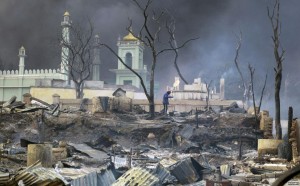 Starting on Wednesday, 20 March, Burma saw a shocking return to the communal violence that engulfed Arakan State last year. In the central town of Meikhtila, Mandalay Division, attacks on people and property, have left at least 32 dead, religious and residential buildings burned to the ground, and more than 6,000 displaced. They are mainly Muslim people who are now living in a temporary refugee camp in a football stadium, 2 miles out of town.
Starting on Wednesday, 20 March, Burma saw a shocking return to the communal violence that engulfed Arakan State last year. In the central town of Meikhtila, Mandalay Division, attacks on people and property, have left at least 32 dead, religious and residential buildings burned to the ground, and more than 6,000 displaced. They are mainly Muslim people who are now living in a temporary refugee camp in a football stadium, 2 miles out of town.
The spark that lit the fuse in Meikhtila was an argument in a gold shop on Wednesday between the Muslim owner and Buddhist customer. A fight broke out and later that day a mob arrived to destroy the shop and nearby Muslim-owned businesses. Fighting in the street escalated as sections of the two communities fought, and by the end of Friday, an unconfirmed number of people had been killed. President Thein Sein declared a State of Emergency on Friday afternoon and order was restored by Saturday morning. The official death toll from the government is 32, announced on state television on Saturday night, but other sources are claiming over 100. It is difficult to attain reliable figures as journalists, both domestic and foreign, were threatened by mobs and some had to hide in a monastery […]
• • •Letpadaung Report Does Not Address Concerns, Places Security Forces Above the Law
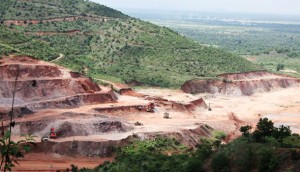 This week the much anticipated report of the Letpadaung investigation commission, appointed by President Thein Sein and chaired by Daw Aung San Suu Kyi, was finally released. The report acknowledges that the mine lacks strong environmental protection measures and would not create more jobs for local people. It also recognizes that farmers were forcibly evicted from their land to make way for the project. However the report says the copper mine project “should not be unilaterally stopped.” This recommendation deeply disappointed local farmers and activists who angrily rejected the commission’s report while the Wanbao Company welcomed it.
This week the much anticipated report of the Letpadaung investigation commission, appointed by President Thein Sein and chaired by Daw Aung San Suu Kyi, was finally released. The report acknowledges that the mine lacks strong environmental protection measures and would not create more jobs for local people. It also recognizes that farmers were forcibly evicted from their land to make way for the project. However the report says the copper mine project “should not be unilaterally stopped.” This recommendation deeply disappointed local farmers and activists who angrily rejected the commission’s report while the Wanbao Company welcomed it.
After the release of the report, Daw Aung San Suu Kyi visited the villages affected by the project to explain the findings of the commission. She called for the communities to stop opposing the project and accept compensation for their lost land. “We have asked the company to first give jobs to our people and second to maintain a healthy environment, according to international standards, and third to provide education and health care for the people,” Daw Aung San Suu Kyi said in a speech in Salingyi Township. But she was confronted by protesters who feel that the report does not acknowledge their demands […]
• • •Rampant Land Confiscation Requires Further Attention and Action from Parliamentary Committee
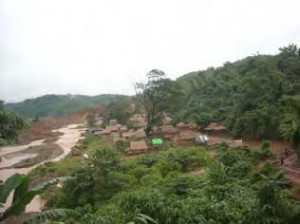 This past week the parliamentary Farmland Investigation Commission submitted its report on land confiscation to the parliament. The report finds that the military have taken almost 250,000 acres of land from villagers. The commission stated that they had spoken to military leaders about the confiscation, “Vice Senior-General Min Aung Hlaing […] confirmed to me that the army will return seized farmlands that are away from its bases, and they are also thinking about providing farmers with compensation.”
This past week the parliamentary Farmland Investigation Commission submitted its report on land confiscation to the parliament. The report finds that the military have taken almost 250,000 acres of land from villagers. The commission stated that they had spoken to military leaders about the confiscation, “Vice Senior-General Min Aung Hlaing […] confirmed to me that the army will return seized farmlands that are away from its bases, and they are also thinking about providing farmers with compensation.”
The investigation is a step in the right direction but there still exist very large problems the commission has not addressed, the first being that the commission only addressed land confiscated by the military. Although the military has been involved in land confiscations they are not the only perpetrators.
An example of the shortcomings of the commission’s report is the fact that the Letpadaung copper mine is not mentioned by the commission because the land was not confiscated outright by the military, although it is a joint venture with the military owned Union of Myanmar Economic Holdings Ltd (UMEH). Additionally the Letpadaung Inquiry Commission headed by Aung San Suu Kyi charged with investigating the abuses that took place has delayed releasing its findings for a third straight time […]
Ko Htay Kywe’s Speech in Geneva
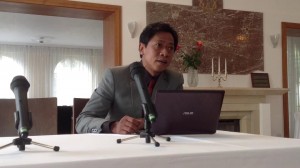 Ko Htay Kywe, a former political prisoner and leader of the 88 Generation Students, gave this speech on the human rights situation in Myanmar at a diplomatic briefing in Geneva, Switzerland on 1 March. He called for the United Nations Human Rights Council and the Special Rapporteur on the Situation of Human Rights in Myanmar to continue to encourage the government to carry out systematic reforms to establish rule of law. He also called for the ongoing mandate of the Special Rapporteur as well as the opening of the Office of the High Commissioner for Human Rights in Myanmar.
Ko Htay Kywe, a former political prisoner and leader of the 88 Generation Students, gave this speech on the human rights situation in Myanmar at a diplomatic briefing in Geneva, Switzerland on 1 March. He called for the United Nations Human Rights Council and the Special Rapporteur on the Situation of Human Rights in Myanmar to continue to encourage the government to carry out systematic reforms to establish rule of law. He also called for the ongoing mandate of the Special Rapporteur as well as the opening of the Office of the High Commissioner for Human Rights in Myanmar.
Burma Still Requires the UN Human Rights Council’s Attention
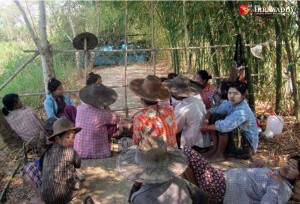 This week 22 organizations from Burma released a statement calling on the 22nd Session of the United Nations Human Rights Council to maintain its resolution on the situation of human rights in Burma under item 4 as “Human rights situations that require the Council’s attention” and to renew the full mandate of the Special Rapporteur Tomás Ojea Quintana. Serious human rights challenges that require the Council’s attention remain as the events of this week illustrate.
This week 22 organizations from Burma released a statement calling on the 22nd Session of the United Nations Human Rights Council to maintain its resolution on the situation of human rights in Burma under item 4 as “Human rights situations that require the Council’s attention” and to renew the full mandate of the Special Rapporteur Tomás Ojea Quintana. Serious human rights challenges that require the Council’s attention remain as the events of this week illustrate.
Border Security Forces in Arakan State allegedly raped 13 young Rohingya women. This highlights the serious remaining issues of the rampant culture of impunity for security forces and the Burma Army and the decades-long discrimination against the Rohingya organized and perpetuated by the government.
In Kachin State, despite ceasefire talks, fighting continued this week making more and more victims on the civilian side […]
• • •Burma’s Ethnic Areas Too Volatile for Foreign Investment
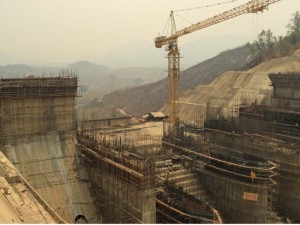 In the same week that China announced that the Shwe oil and gas pipeline that runs across Burma will be completed in May, a report from the Transnational Institute and Burma Centre Netherlands, Developing Disparity: Regional Investment in Burma’s Borderlands, warns that foreign investment in ethnic areas has the potential to exacerbate ethnic tensions and disempower local communities.
In the same week that China announced that the Shwe oil and gas pipeline that runs across Burma will be completed in May, a report from the Transnational Institute and Burma Centre Netherlands, Developing Disparity: Regional Investment in Burma’s Borderlands, warns that foreign investment in ethnic areas has the potential to exacerbate ethnic tensions and disempower local communities.
The completion of the 700-mile Shwe dual oil and gas pipeline will conclude the opening chapter of a project that has created a platform for a plethora of human rights abuses. Transporting oil and gas from the Bay of Bengal, the pipeline starts in Arakan State, and passes through Magway and Mandalay Divisions and Shan State, before finishing in Yunnan province, China. While the military controlled company, the Myanmar Oil and Gas Enterprise will gain up to $29 billion over the next 30 years through sale of oil and gas to China, the project has already negatively affected communities across Burma, as the Ta’ang Students and Youth Organization recently documented in Ta’ang areas of Shan State […]
Same Constitution, Same Problems
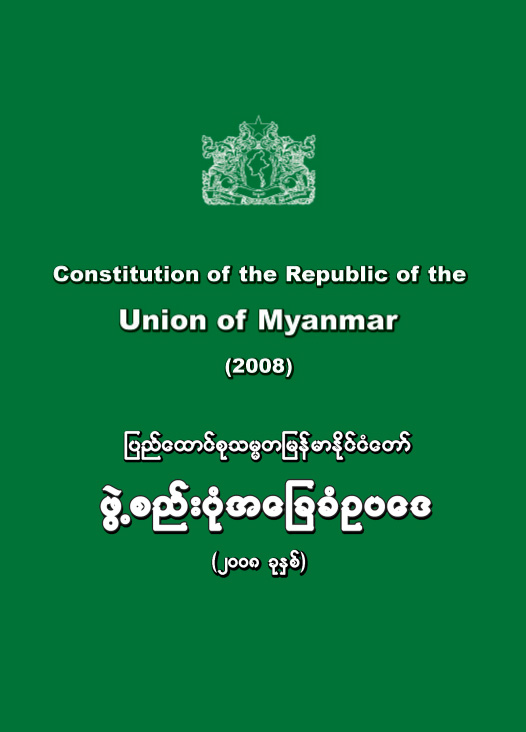 The Special Rapporteur on the Situation of Human Rights in Myanmar, Tomás Ojea Quintana, finished his 7th visit to Burma on Saturday and his report highlights the grave human rights concerns in Burma today. The escalation of conflict in Kachin State, communal violence in Arakan State, the continuing detention and torture of political prisoners, land confiscation due to development projects, restrictions on freedom of association and assembly are among the poor human rights conditions stated in his report. The scale of such human rights violations, in spite of the reforms initiated by the government, emphasizes the necessity of the role of the Special Rapporteur.
The Special Rapporteur on the Situation of Human Rights in Myanmar, Tomás Ojea Quintana, finished his 7th visit to Burma on Saturday and his report highlights the grave human rights concerns in Burma today. The escalation of conflict in Kachin State, communal violence in Arakan State, the continuing detention and torture of political prisoners, land confiscation due to development projects, restrictions on freedom of association and assembly are among the poor human rights conditions stated in his report. The scale of such human rights violations, in spite of the reforms initiated by the government, emphasizes the necessity of the role of the Special Rapporteur.
Many of the human rights violations that Quintana reported have a direct obstacle in the path of correcting these abuses: the 2008 Constitution. The 2008 Constitution was written by the military without Daw Aung San Suu Kyi and the National League for Democracy or genuine representation from Burma’s ethnic areas. It was described by the 88 Generation Students Group as a “sham constitution” and through corruption, fraud and intimidation, the ruling junta outrageously claimed that 92% of the people who voted ratified the document […]
Humanitarian Aid Denied
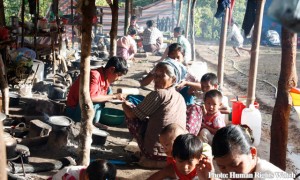 This week’s ceasefire talks between the Kachin Independence Army (KIA) and the Burma Government are a positive step in what has been a devastating conflict rife with human rights abuses, displacement and death. While these talks have been praised by both international governments and the United Nations, there remain many obstacles to a sustainable political settlement and lasting peace.
This week’s ceasefire talks between the Kachin Independence Army (KIA) and the Burma Government are a positive step in what has been a devastating conflict rife with human rights abuses, displacement and death. While these talks have been praised by both international governments and the United Nations, there remain many obstacles to a sustainable political settlement and lasting peace.
Hostilities are still occurring and combatants continue to resupply, increasing tensions in an already frail situation. One positive step that has been taken is the allowance of aid to those in KIA-held areas affected by the conflict. Though it should be stated that the size and scope of this aid needs to conform to the needs identified on the ground and if all of those affected will receive adequate help is yet to be determined. It is estimated that over 160,000 people have been displaced over the course of fighting. These people are living in makeshift camps and without emergency aid are at great risk of humanitarian tragedy […]









 All posts
All posts